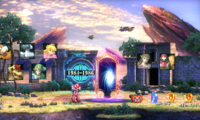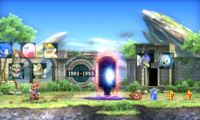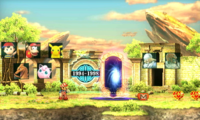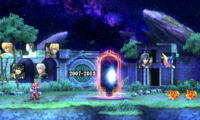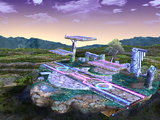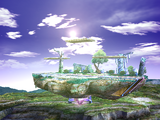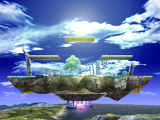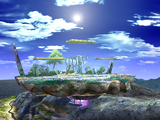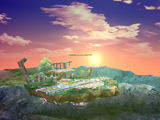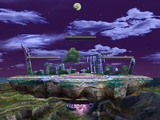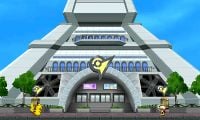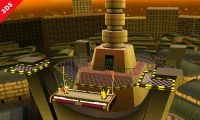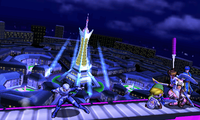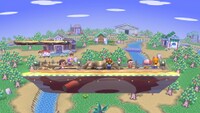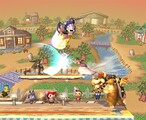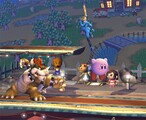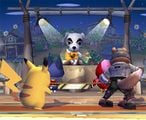Time change: Difference between revisions
m (→Prism Tower) |
Luigifan18 (talk | contribs) m (→Town and City: Grammar check) |
||
| Line 71: | Line 71: | ||
===[[Town and City]]=== | ===[[Town and City]]=== | ||
Time changes on this stage depend on Wii U system clock, like on Smashville. The clock on the Happy Room Academy building during the city phase of the background transition also matches the system clock. | Time changes on this stage depend on the Wii U system clock, like on Smashville. The clock on the Happy Room Academy building during the city phase of the background transition also matches the system clock. | ||
===[[Umbra Clock Tower]]=== | ===[[Umbra Clock Tower]]=== | ||
Revision as of 18:55, August 31, 2018
Time change is a feature from Super Smash Bros. Brawl onward where some stages and areas depict various transitions in time over the course of a match. All effects are purely aesthetic and have no impact on gameplay.
The extent of transformation depends on the stage. Some stages show rapid changes in time, while others change in response to the console's internal clock when the match is started. Three time changes also take place in real-time, with replays of these saved matches featuring the time based on when the replay is played back.
List of stages with time changes
All-Star Rest Area (SSB4)
Super Smash Bros. 4's All-Star Rest Area is unusual amongst time-changing stages in that it does not change while the player is in it. Instead, the stage progresses from dawn to dusk as the All-Star Mode is progressed through.
- Dawn: Violet sky with clouds that are tinted pink. Appears after the first stage.
- Midday: Clear skys with few clouds. Appears after stages 2 and 3.
- Evening: A yellow sunset with clouds that are tinted orange. Appears after stage 4.
- Night: A dark sky with numerous stars and some galaxies. Appears after stages 5 and 6.
Battlefield (SSBB)
Battlefield features a day to night cycle. A sundial behind the playable area shows the time of day as well. The cycle lasts three minutes.
- Evening: Everything turns more dark-red (more in the background, less on the stage).
- Night: Everything turns more dark-blue (again, more in the background than on the stage), the sub-platforms turn dark-blue with small blue stripes and stars and the moon can be seen.
- Dawn: Light is seen on the mountains range in the background.
Battlefield (SSB4)
This stage has a daily cycle, like Brawl Battlefield, on both the Wii U and 3DS versions of the game. The cycle lasts two minutes.
Battlefield (SSBU)
This stage has a daily cycle, like Brawl and Smash 4.
Gaur Plain
Gaur Plain undergoes a day-to-night transition. The stage starts off in its day configuration. In Super Smash Bros. for Wii U, Metal Face appears at night.
Home-Run Contest
In both Brawl and Smash 4, if the Sandbag is hit far enough, the time will change from day to evening, and then night. If hit even farther, it will change from night to day again.
Prism Tower
Prism Tower's time change aspects are linked to the where the fight is taking place. At the ground level of Lumiose City, the stage takes place in the day; as the stage begins to go higher up Prism Tower time passes, and at the apex the stage turns to night.
- Dawn: Occurs at the start of the match, as well as when the stage returns to the base of Prism Tower.
- Evening: Occurs halfway up the tower; the light is tinged with yellow and orange, as to stimulate sunset.
- Night: Occurs at the top of the tower, as well as when the stage flies in the skies of Lumiose City. The lighting becomes dark blue as to stimulate night, and numerous buildings seen below the stage have their windows lighted. The Prism Tower itself also features uniquely colored lighting on its spire. This is the version seen in the Ω form.
Smashville
Like the Animal Crossing games, Smashville's time changes are based on the actual system clock, and do not occur in the normal run of a match. The system clock also determines what time shows up on the clock of the Town Hall building. This applies to both the Brawl and Smash Wii U versions of the stage.
- Night: The background is dark, except for a few lights in the houses. Also, constellations can be seen in the sky.
- Saturday, 8:00 PM - 12:00 AM: K.K. Slider holds a concert in the background, playing one of six different songs.
Town and City
Time changes on this stage depend on the Wii U system clock, like on Smashville. The clock on the Happy Room Academy building during the city phase of the background transition also matches the system clock.
Umbra Clock Tower
In Super Smash Bros. 4, the face of the falling clock tower face matches the system's internal clock. It is even possible to see the clock hands moving. If the game is paused, the clock stops moving; when the game is un-paused, the clock skips ahead and resumes moving from the time at which the game was un-paused.
Yoshi's Island
This stage uniquely features a seasonal cycle, with each season lasting about 30 seconds. In both Brawl and Smash 4, the song Obstacle Course syncs to the different seasons, with one variant playing in Autumn and Winter, and another playing during Spring and Summer.
- Autumn: The gigantic flowers go down and the background turns more orange.
- Winter: The sky turns blue while the rest of the background is covered by snow, save for a few tips of grasses. It also snows.
- Spring: The sun comes out, the snow disappears, and the grass appears while they are turning from brown to green.
- Summer: The big flowers appear and everything becomes greener.
